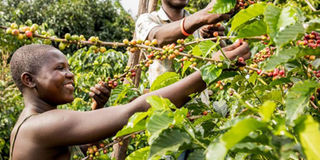Uganda registers highest coffee exports in 30 years

Farmers picking red coffee cherries that are desirable at the world market. Photo | File
What you need to know:
- Latest data from the authority show a steady recovery of the crop as volume exports increased by 43 per cent from 3.557 million bags exported in the 2015/16 Financial Year to 5.103 million bags in 2019/20. This is the highest volume of coffee that Uganda has ever exported in the last 30 years.
Coffee exports in Uganda have recorded the highest ever export volumes, according to the Uganda Coffee Development Authority.
Latest data from the authority show a steady recovery of the crop as volume exports increased by 43 per cent from 3.557 million bags exported in the 2015/16 Financial Year to 5.103 million bags in 2019/20. This is the highest volume of coffee that Uganda has ever exported in the last 30 years.
According to the regulator, the increase in exports has been attributed to increased production following fruition of newly planted trees without significant effects of the coronavirus pandemic affecting export destinations.
A severe dry spell in the world’s largest producer, Brazil, led to a decrease of bags from 37.2 million bags down from 38.8 million bags harvested in 2019/20.
The ICO notes that overall global exports were down 3.8 per cent for the first 10 months of the 2020 amid the Covid-19 scare, but the shipments recovered. In October 2020, the first month of the coffee year 2020/21, global exports totaled 9.67 million bags.
Production continues to outpace demand, a trend that continues this year.
Coffee is Uganda’s priority commodity and plays a leading role in the livelihoods of many Ugandans contributing on average 30 per cent to the national economy.
It supports over 1.7 million farming families in 114 districts. But the farmers are still complaining of the low prices. Coffee costs about Shs3,800 at the farm. Cleaned coffee, commonly known as Fair Average Quality (FAQ), costs about Shs3,900 a kilo.
UCDA Managing Director, Emmanuel Iyamulemye Niyibigira says exports can be complemented with efforts at home to offer more benefits to farmers.
“We have started a process where we bring experts from abroad who are medical people so that they explain that coffee actually has health benefits. We are also looking at how we can promote roasting in the country by training youths and barristers on how to serve a good cup of coffee. We have helped to generate many cafes,” Iyamuremye says.




